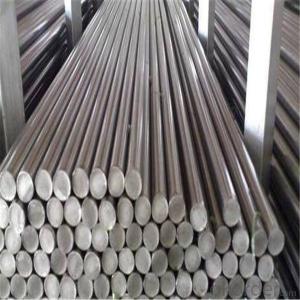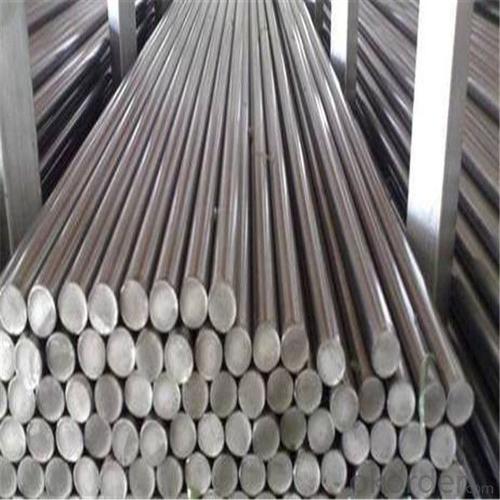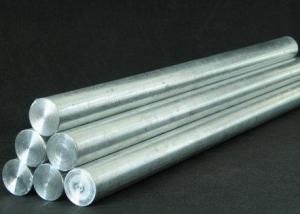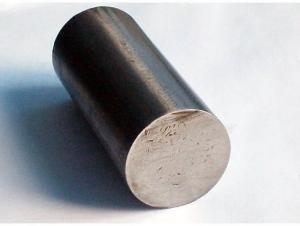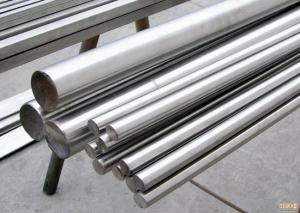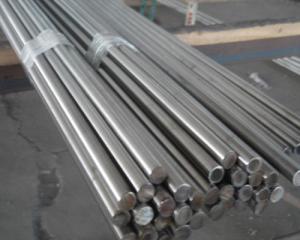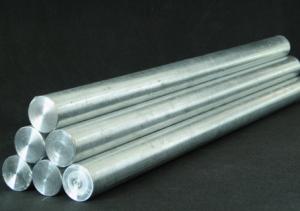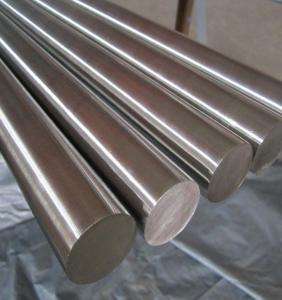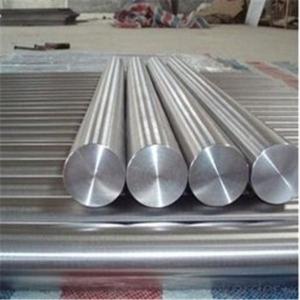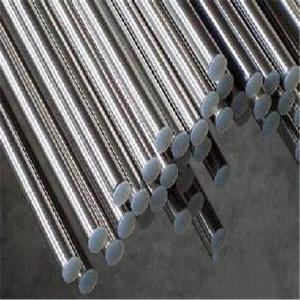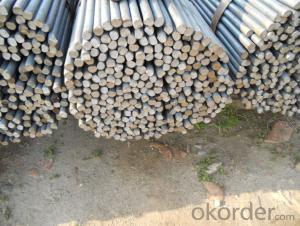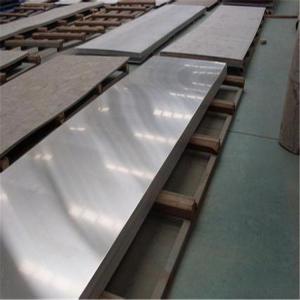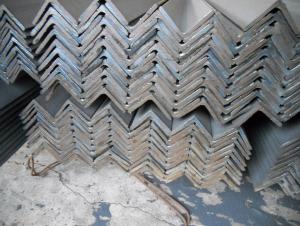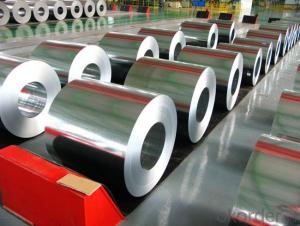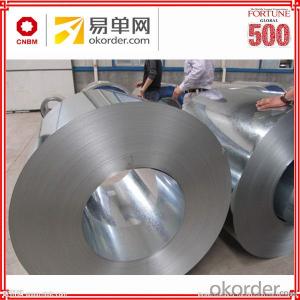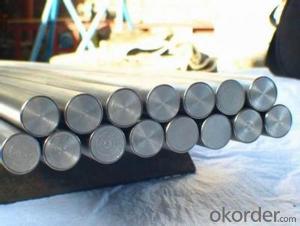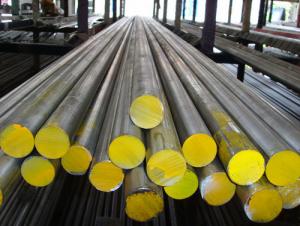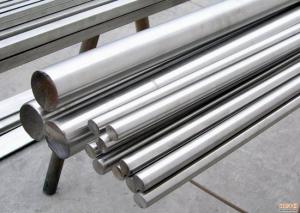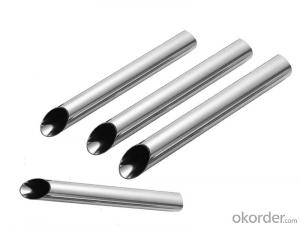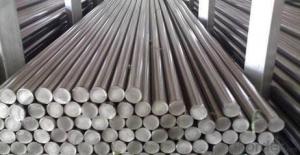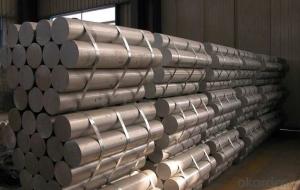Stainless Steel Bar with great price China Manufacturer
- Loading Port:
- Shanghai
- Payment Terms:
- TT OR LC
- Min Order Qty:
- 5 m.t.
- Supply Capability:
- 3500 m.t./month
OKorder Service Pledge
OKorder Financial Service
You Might Also Like
Specification
High Quality stainless steel bar with great price
Detailed Information
Name | SAE1045 Carbon Steel Round Bar |
Shape | Round Bar/Square Bar/Flat Bar/Plate/Wire |
Standard | GB/ASTM/SAE/AISI/DIN/JIS/EN/BS |
Surface Treatment: | Black/Peeling/Polished/Machined |
Delivery Condition: | Hot Rolled or Forged/Peeled or Black Surface |
Test | SGS/UT 100% Elements Testing |
Certificate: | ISO/Mill Certificate |
Service: | 24 hours online service / more than 20 years trading and manufacture |
Quality Assurance: | the third party inspection, such as SGS, BV, TUV…etc. is acceptable |
Packaging Details: | standard packing / genuine packing / as per customer's packing instruction |
Product Overviews
Product Name | Typical Grades | Diameter(mm) | Standard Adopted |
Carbon Steel | 20 (1020/S20C/C22) |
Ø16-Ø300 |
GB/SAE/ JIS/DIN |
40 (1040/S40C/C40) | |||
45 (1045/S45C/C45) | |||
Bearing Steel | GCr9 (51100/SUJ1) |
Ø12-Ø250 | |
GCr15 (52100/SUJ2/100Gr6) | |||
GCr9SiMn (A485-Gr.1/SUJ3) | |||
Cr-Mo Steel | 20Cr (5120/SCr420H/20Cr4) |
Ø12-Ø250 | |
40Cr (5140/SCr440/41Cr4) | |||
42CrMo(4140/SCM440/42CrMo4) | |||
Gear Steel | 20CrNiMo |
Ø16-Ø600 | |
20CrMn(5115/SMnC420/20MnCr5) | |||
20CrNiMo(8620/SNCM220/20CrMiMo2) |
Chemical Composition & Properties
Chemical Composition | Mechanical Properties | |||
C | 0.17-0.23 | Tensile strength(MPA) | 930 | |
Si | 0.17-0.37 | Yield strength (MPA) | 735 | |
Mn | 0.90-1.20 | Elongation (δ5/%) | 10 | |
Cr | 0.90-1.20 | Reduction in Area (ψ/%) | 45 | |
Mo | 0.05 | Impact (J) | 47 | |
P | ≤0.030 | Hardness | 187HBW | |
S | ≤0.030 | |||
V | --- | |||
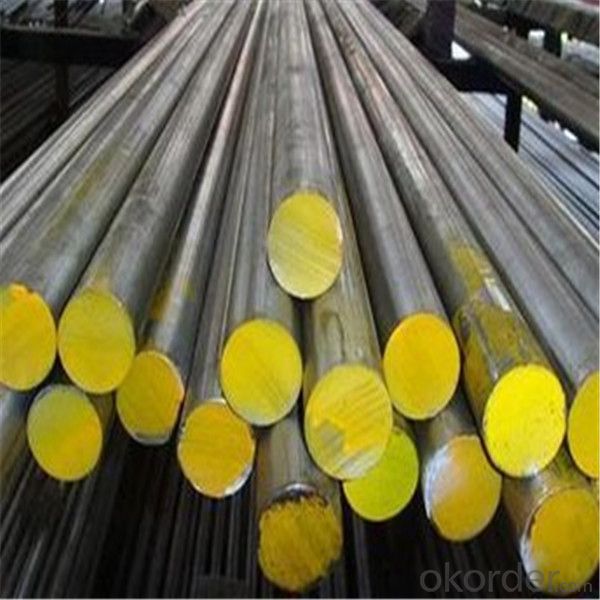
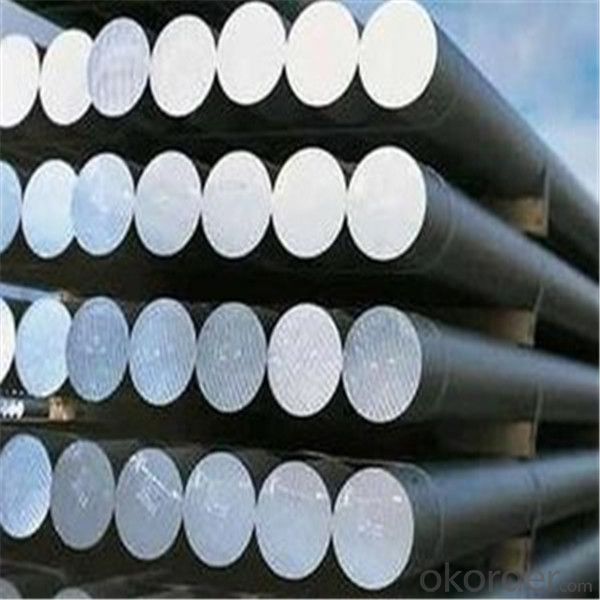
Application
Carbon Steel | l Mold bottom l Plastic mold l Construction machinery parts l Automobile parts l Security grills l Screens l Construction |
Bearing Steel | l Aerospace l Navigation l Nuclear energy l Chemical industry l Electronic information l Petrochemical l Instrument and meter l Transportation |
Cr-Mo Steel | l Mechanism & Fasteners gear l Stressed components for vehicles l Engines and machines l Parts of larger cross-section |
Gear Steel | l All kinds of gears l Statically and dynamically stressed component for vehicles l Engines and machine l Larger cross-section parts l Crankshafts |
After-sale service | l CNBM provides the services and support you need for every step of our cooperation. We’re the business partners you can trust; you can relax and get on with doing business. l For any problem, please kindly contact us at any your convenient time, we’ll reply you in our first priority within 24 hours
|
Advantages
| l Industry experience over 20 years. l Shipment of goods -More than 70 countries worldwide. l The most convenient transport and prompt delivery. l Competitive price with best service. l High technical production line with top quality products. l High reputation based on best quality products.
|
Packaging & Delivery
Packaging Detail | Sea worthy packing /as per customer's packing instruction |
Delivery Detail | 15 ~ 40 days after receiving the deposit |
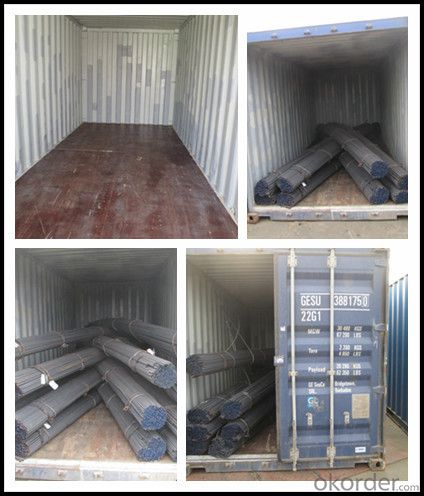
- Q: What are the applications of stainless steel bars in the chemical processing industry?
- Stainless steel bars have numerous applications in the chemical processing industry due to their exceptional properties and characteristics. Some of the key applications of stainless steel bars in this industry include: 1. Corrosion resistance: Stainless steel bars are highly resistant to corrosion, making them ideal for use in chemical processing plants where exposure to corrosive chemicals is common. They can withstand harsh environments and prevent the contamination of chemicals being processed. 2. Heat resistance: Stainless steel bars have excellent heat resistance, enabling them to withstand high temperatures often encountered in chemical processing. This property ensures their durability and reliability in applications such as heat exchangers, reaction vessels, and furnaces. 3. Strength and durability: Stainless steel bars possess high tensile strength and toughness, making them suitable for heavy-duty applications in the chemical processing industry. They can withstand pressure, impact, and mechanical stress, ensuring the safety and longevity of equipment. 4. Hygiene and cleanliness: Stainless steel bars have a smooth, non-porous surface that is easy to clean and maintain. This property is crucial in chemical processing plants, where cleanliness and hygiene are essential to prevent contamination. Stainless steel bars also have excellent resistance to bacteria growth, ensuring the quality of the processed chemicals. 5. Versatility: Stainless steel bars come in various grades and sizes, allowing for versatility in their applications. They can be easily fabricated, welded, and formed into different shapes and structures to meet specific requirements in chemical processing equipment. This versatility makes stainless steel bars suitable for a wide range of applications, including pipes, fittings, valves, and storage tanks. 6. Chemical compatibility: Stainless steel bars exhibit excellent chemical compatibility with many substances commonly used in the chemical processing industry. They can withstand exposure to acids, alkalis, solvents, and other corrosive chemicals without degradation or contamination, ensuring the integrity of the processing equipment. In summary, stainless steel bars offer numerous advantages in the chemical processing industry due to their corrosion resistance, heat resistance, strength, durability, hygiene, versatility, and chemical compatibility. These properties make stainless steel bars an ideal choice for various applications, providing reliable and long-lasting solutions for chemical processing plants.
- Q: Are stainless steel bars suitable for dairy farming equipment?
- Yes, stainless steel bars are highly suitable for dairy farming equipment. Stainless steel is a popular choice in the dairy industry because of its numerous beneficial properties. Firstly, stainless steel is highly resistant to corrosion, which is essential in an environment like a dairy farm where there is constant exposure to water, cleaning agents, and chemicals. This corrosion resistance ensures the longevity and durability of the equipment, resulting in reduced maintenance and replacement costs. Additionally, stainless steel is a hygienic material that can be easily cleaned and sanitized. Dairy farming equipment needs to meet strict hygiene standards to ensure the safety and quality of dairy products. Stainless steel's smooth surface is non-porous, preventing the growth of bacteria, and making it easy to clean and maintain high standards of cleanliness. Another advantage of stainless steel is its strength and impact resistance. Dairy farming equipment often needs to withstand heavy loads, pressure, and rough handling. Stainless steel bars provide the necessary strength and durability to handle these conditions without bending or breaking. Furthermore, stainless steel is a non-reactive material, meaning it does not interact with milk or other dairy products. This ensures that the taste, quality, and nutritional value of the dairy products remain intact. In summary, stainless steel bars are an excellent choice for dairy farming equipment due to their corrosion resistance, hygienic properties, strength, and non-reactivity. Using stainless steel in dairy farming equipment ensures longevity, easy maintenance, and compliance with hygiene standards, making it a suitable and reliable material for the dairy industry.
- Q: How do stainless steel bars resist corrosion?
- The unique composition and properties of stainless steel bars enable them to resist corrosion. To begin with, stainless steel contains at least 10.5% chromium, which, when exposed to oxygen, creates a thin layer of chromium oxide on the surface. This layer effectively shields the steel from corrosion and prevents further oxidation or rusting. Furthermore, the inclusion of other alloying elements like nickel, molybdenum, and nitrogen enhances the corrosion resistance of stainless steel bars. These elements stabilize the protective oxide layer, making it more resistant to chemical attacks from acids, alkalis, and other corrosive substances. Moreover, stainless steel bars possess a high level of passivity, meaning they possess a natural ability to self-repair when damaged. If the chromium oxide layer is scratched or harmed, it immediately reacts with oxygen in the atmosphere to form a new layer, sealing off the exposed area and preventing the spread of corrosion. In addition, stainless steel bars exhibit exceptional resistance to pitting corrosion, a localized form of corrosion that can occur in chloride-rich environments. The alloying elements in stainless steel enhance its resistance to pitting, making it suitable for applications in marine environments or areas exposed to saltwater. To summarize, stainless steel bars resist corrosion through the formation of a protective chromium oxide layer, the addition of alloying elements, and their ability to self-repair. These properties make stainless steel bars highly durable and reliable in various industries, including construction, manufacturing, and infrastructure.
- Q: Are stainless steel bars resistant to scaling at high temperatures?
- Yes, stainless steel bars are highly resistant to scaling at high temperatures. Scaling refers to the formation of oxide layers on the surface of metals when exposed to high temperatures. Stainless steel contains a high percentage of chromium, which forms a protective layer of chromium oxide on its surface. This layer acts as a barrier, preventing further oxidation and scaling. Consequently, stainless steel bars can maintain their integrity and resist scaling even in extreme heat conditions, making them suitable for various applications in industries such as aerospace, chemical processing, and power generation.
- Q: What is the composition of stainless steel bars?
- Stainless steel bars are primarily composed of iron, combined with varying amounts of chromium, nickel, and other elements. The exact composition of stainless steel bars can vary depending on the specific grade or type of stainless steel being used. Chromium is the key element that provides stainless steel with its corrosion-resistant properties. It forms a thin layer of oxide on the surface of the steel, known as a passive layer, which helps protect the underlying material from rust and corrosion. Nickel is often added to stainless steel to enhance its resistance to corrosion, as well as improve its strength and durability. Other elements such as molybdenum, titanium, copper, and manganese may also be present in smaller quantities to further enhance specific properties of the stainless steel bars, such as increased resistance to pitting or high-temperature strength. Overall, the composition of stainless steel bars is carefully tailored to achieve the desired combination of strength, corrosion resistance, and other specific properties required for various applications.
- Q: What are the different cutting techniques for stainless steel bars?
- Different cutting techniques are commonly employed for stainless steel bars, depending on the specific requirements and desired outcome. Here are some of the various methods used: 1. Shearing: For cutting stainless steel bars, shearing is a frequently used technique. It involves applying a downward force with a straight-edge blade, effectively cutting through the material. This method is suitable for thin bars, providing a clean and straight cut. 2. Sawing: Sawing utilizes specialized saw blades to cut through stainless steel bars. It is a versatile technique that can be employed for bars of various thicknesses and sizes. Depending on the application, bandsaws, circular saws, or reciprocating saws can be utilized. 3. Abrasive cutting: Also referred to as grinding or cutting off, abrasive cutting involves using abrasive wheels or disks to remove material from the stainless steel bar. This technique is often used for cutting thick bars or for precision cutting, as it allows for greater control over the process. 4. Laser cutting: Laser cutting is a high-precision method that employs a focused laser beam to melt or vaporize the stainless steel bar along a predetermined cutting line. This approach yields clean and precise cuts with minimal heat-affected zones, making it ideal for intricate or complex cutting patterns. 5. Waterjet cutting: Waterjet cutting involves using a high-pressure stream of water mixed with an abrasive substance to cut through the stainless steel bar. The high velocity of the waterjet, combined with the abrasive material, allows for precise and intricate cuts without heat distortion or mechanical stress. 6. Plasma cutting: Plasma cutting utilizes a high-temperature plasma arc to melt through the stainless steel bar. This technique is suitable for quickly and accurately cutting thick bars, and it can be used for both straight cuts and curved shapes. When selecting the appropriate cutting technique, it is crucial to consider factors such as the thickness and size of the stainless steel bar, the desired level of precision, and the available equipment. Consulting with professionals or experts in metal fabrication can provide valuable guidance in determining the most suitable cutting method for specific project requirements.
- Q: Are stainless steel bars suitable for machining?
- Yes, stainless steel bars are suitable for machining. Stainless steel is known for its excellent machinability, making it easy to cut, shape, and drill. It also offers high strength and durability, making it suitable for various machining applications in industries such as automotive, aerospace, and manufacturing.
- Q: How are stainless steel bars priced?
- Stainless steel bars are priced based on several factors. Firstly, the grade or quality of the stainless steel plays a significant role in determining the price. Higher-grade stainless steel bars, such as those made from 316 or 304 stainless steel, are generally more expensive due to their superior corrosion resistance and durability. The dimensions and size of the stainless steel bars also impact the pricing. Longer and thicker bars tend to be more costly as they require more raw material and manufacturing processes. Additionally, specialized shapes or customized cuts may incur additional costs. Market demand and supply dynamics also influence the pricing of stainless steel bars. Fluctuations in raw material costs, availability, and overall demand for stainless steel products can lead to price variations. Economic conditions, global trade policies, and geopolitical factors can also impact stainless steel bar prices. Furthermore, the price of stainless steel bars is influenced by the supplier or distributor. Different suppliers may have varying pricing strategies, overhead costs, and profit margins, which can result in different prices for the same product. Lastly, it is important to consider any additional costs such as transportation, packaging, or taxes that may be included in the final pricing of stainless steel bars. Overall, stainless steel bar prices are determined by the grade, size, market conditions, supplier factors, and additional costs associated with the product.
- Q: What is the weight of a standard stainless steel bar?
- The weight of a standard stainless steel bar can vary depending on its dimensions and grade. However, a commonly used standard stainless steel bar, such as ASTM A276/A479 Type 304 or 316, typically has a density of around 7.93 grams per cubic centimeter (g/cm³) or 7930 kilograms per cubic meter (kg/m³). To calculate the weight of the bar, one would need to know the length, width, and height of the bar in order to determine its volume and then multiply it by the density mentioned above.
- Q: Can stainless steel bars be used in pulp and paper mills?
- Yes, stainless steel bars can be used in pulp and paper mills. Stainless steel is highly resistant to corrosion, making it suitable for use in environments with high moisture and chemicals, such as pulp and paper mills. Additionally, stainless steel's strength and durability make it a reliable choice for various applications within these mills.
Send your message to us
Stainless Steel Bar with great price China Manufacturer
- Loading Port:
- Shanghai
- Payment Terms:
- TT OR LC
- Min Order Qty:
- 5 m.t.
- Supply Capability:
- 3500 m.t./month
OKorder Service Pledge
OKorder Financial Service
Similar products
Hot products
Hot Searches
Related keywords
